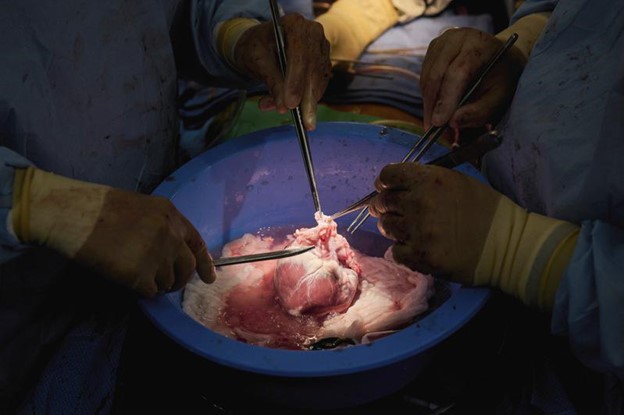
Is death "reversible"? Yale scientists successfully resurrect dead pig organ cells
【《We Chinese in America》Media Editor Tang Zhao, August 5, 2022】The Yale University research team successfully "resurrected cells" and "restored function" of organs in dead pigs in experiments. The picture shows a genetically modified pig heart. (Associated Press)
The latest research results published by the Yale University research team in the journal "Nature" on the 3rd have made the scientific community begin to rethink "the line between life and death"; this experiment successfully "revived" dead pig cells and "recovered organs" The main purpose of the research is to enable the medical community to obtain "viable organs" for a long time after the death of patients in the future, and more human organs can be used for organ transplantation.
The New York Times reported that scientists at Yale University used a heart-lung machine-like device to inject a special solution called OrganEx into the dead pigs that had been dead for an hour in the laboratory. Although the pigs had no blood circulation, a still heart, flat brain waves, and were thought to have no consciousness, their seemingly dead cells were "revived" after infusion with OrganEx's special solution, their hearts began to beat, and the solution in the veins and arteries In the mid-circulation, organ cells such as the heart, liver, kidneys and brain all return to function, and the body is not as rigid as a typical dead pig.
On the other hand, if other pigs died for an hour, if they received the treatment of "Ekeme" (official name is Extracorporeal Membrane Oxygenation, ECMO), the body will become stiff, the organs will be swollen and damaged, the blood vessels will collapse, and there will be purple spots on the back.
The findings are still just the first steps, and the technology is "very far from being used in humans," said Yale bioethicist Stephen Latham, who worked closely with the research team.
But a team led by Nenad Sestan, a professor of neuroscience, comparative medicine, genetics and psychiatry at the Yale School of Medicine, was struck by the technology's ability to revive cells; co-author of the paper, Yale Neuroscience "The recovery of all this is incredible," said scientist David Andrijevic.
Others unrelated to the study were similarly surprised. "This study raises questions about the definition of death," said Nita Farahany, a Duke University law professor who studies the ethical, legal and societal implications of emerging technologies. "We think of death as a state of being; is there a 'reversible form of death'.
The research work began a few years ago, when the team first conducted a similar experiment on the brains of dead pigs in the slaughterhouse. Four hours after the pigs died, they injected a solution called BrainEx, similar to OrganEx, and saw that the dead brain cells could be resurrected. Start exploring if it's possible to restore the entire body.
OrganEx solution contains nutrients, anti-inflammatory drugs, drugs to prevent cell death, "nerve blockers" that inhibit neuronal activity and prevent pigs from regaining consciousness, and artificial hemoglobin that mixes the animal's own blood.
Yale has applied for a patent for this technology. The next step, says Seton, is to see if the organ functions properly and can be transplanted successfully; the researchers also hope to further test whether the approach can repair damaged hearts or brains.
Robert Porte, a transplant surgeon at the University of Groningen in the Netherlands, commented in the journal "Nature" that if OrganEx can revitalize organs, the effect "will be huge" and the number of organs available for transplantation will greatly increase.
OrganEx raises "tough questions about life and death," said Brendan Parent, director of transplant ethics and policy research at NYU Grossman School of Medicine, noting that "according to accepted medical and legal definitions of death, these pigs have been dead; the key question now is: what function will change this?”
If the researchers didn't use the neuroleptics in the solution, and the pigs' brains returned to function, would the pigs still be dead? If the goal is to preserve the organ for transplantation, and the pig regains a certain level of consciousness in the process, ethical issues arise.
(Source: World News Network)
This website has a free subscription function, please enter your email address and name (any nickname) in the upper right corner of the page. After subscribing, you can receive timely updates of the website. I hope that new and old readers will actively subscribe, so that we have the opportunity to provide you with better services
Please click: Home (wechineseus.com) for more news and content on this website
Follow The Chinese Media's Twitter account: https://twitter.com/wechineseinus
Follow The Chinese Media's Facebook account: https://www.facebook.com/wechineseinamerica/










